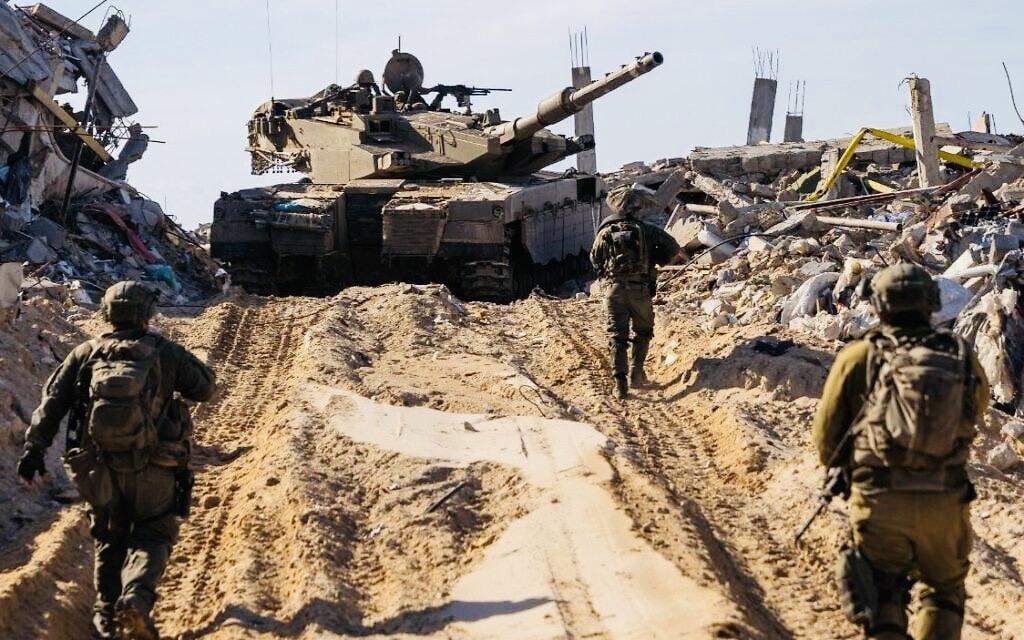The families, friends and supporters of the hostages held by Hamas have implored Prime Minister Benjamin Netanyahu not to widen the war in the Gaza Strip. “The expansion of military operations puts every hostage at grave risk,” the families said in a recent statement. “We implore our decision makers: Prioritize the hostages. Secure a deal. Bring them home — before it’s too late.”
They have a point.
Netanyahu’s wife, Sara, and U.S. President Donald Trump each said last week that fewer than 24 hostages still remain alive. It is conceivable that a renewed military campaign may well doom them.
A compassionate person will understand the grief and anguish of the hostages’ families. The remaining hostages must be released as soon as possible. They have endured unimaginable terror.
Yet, at the risk of sounding callous, victory over Hamas takes precedence over the safe return of the rest of the hostages.

To be blunt, the lives of ten million Israelis, and Israel’s future as a sovereign Jewish state, weigh more heavily than the lives of the hostages.
Last week, Netanyahu described the hostages’ release as “a very important goal,” but added that the “supreme” objective of the war is “victory over our enemies.”
A day later, the chief of staff, General Eyal Zamir, contradicted Netanyahu, saying that Israel’s “supreme mission” and “moral duty” boil down to the release of the hostages. Yet he also said that this objective is inextricably intertwined with Hamas’ defeat. As he put it, “We will increase our activities until both tasks are completed.”

What this means in practice is crystal clear.
Hamas’ military capabilities must be destroyed once and for all and Hamas must never be able to govern Gaza again.
If these interrelated objectives cannot be achieved, the war will have been a wasted effort, the lives of the 414 soldiers killed in combat in Gaza since 2023 will have been in vain, and Hamas will possibly be in a position to regroup, rearm and strike Israel again and again in the future.
This is not an irrational fear. Hamas leaders have repeatedly declared that Israel’s destruction is their cherished long-term aim.
These compelling imperatives account for the fact that the Israeli cabinet, on May 4, unanimously authorized Operation Gideon’s Chariots, a planned offensive to strip Hamas of its military and governing capabilities, while exerting intense pressure on it to free all the hostages
To that end, Israel began calling up tens of thousands of reservists.
Israel, however, will not renew its offensive while Trump is visiting Saudi Arabia, Qatar and the United Arab Emirates. His trip is due to begin later this month.
And Israel will only undertake a campaign of this size and complexity should current efforts to renew the ceasefire fail.
Israel broke the six-week, three-part ceasefire two months ago, citing its refusal to implement phase two, which calls for Israel’s complete withdrawal from Gaza and its agreement to end the war. By contrast, Hamas insists that these provisions must be fully honored.
Let’s be clear. Hamas can only survive as a military and political organization if Israel pulls out of Gaza.
Herein lies the insurmountable problem.
The chances of a new truce are extremely slim because Israel has no intention of ending the war or pulling out of Gaza unless Hamas is vanquished.
Last week, Ron Dermer, the minister of strategic affairs and Netanyahu’s confidant, predicted that the war would last another year.
Several days ago, Hamas’ health minister said that Hamas is no longer interested in conducting ceasefire talks with Israel unless it halts its “hunger war” against Gaza. For the past two months, Israel has blocked the flow of humanitarian supplies into Gaza, saying that they have been partially seized by Hamas and criminal gangs.
Netanyahu, in outlining Israel’s strategy, said, “Wars are won decisively. We have not finished the war. We will finish it. We will achieve full victory in Gaza.”
And in an illusion to the hostages, he said, “We will not give up on anyone.”
Netanyahu, in a shift of tactics, said that Israel will henceforth hold ground it captures. In the past, Israel withdrew from captured areas, enabling Hamas to regroup.
The Israeli army spokesman, Effie Defrin, said that Israeli forces will clear territory, raze Hamas infrastructure, move Palestinian civilians southward, and take control of humanitarian aid supplies so that they do not fall into the wrong hands.
David Mencer, a government spokesman, said that Israeli soldiers will hold ground for an indefinite period of time “to prevent Hamas from taking it back.”
Mencer said that Israel has no intention of permanently occupying Gaza, a scenario that would arouse international condemnation.
Finance Minister Bezalel Smotrich hews to a completely different narrative, in line with Netanyahu’s belief that Israel should ultimately retain security control of Gaza.
On May 3, Smotrich said that Israel will occupy Gaza, even if there is another hostage deal.
“Within a few months, we will be able to declare that we have won,” he said. “Gaza will be totally destroyed. In another six months, Hamas won’t exist as a functioning entity.”
Smotrich, a proponent of renewed settlement in Gaza, predicted that Gaza’s civilian population eventually will be confined to a narrow swath of land in the south.
Culture Minister Miki Zohar disclosed that the real goal of Israel’s planned offensive is the “complete occupation” of Gaza. He admitted that Israel’s campaign will “endanger” the hostages, but “there is no choice left.”
The fate of the hostages is important, but Hamas’ elimination as a military and governing force in Gaza is of crucial importance.
